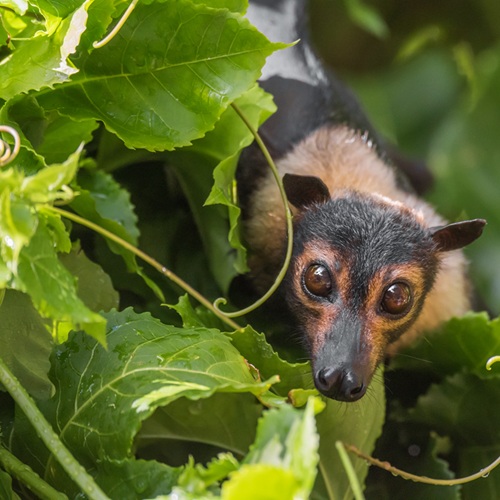POWERHOUSE POLLINATORS
THE BATS AND THE BEES
13 OCTOBER 2025
When people think of pollinators, bees usually come to mind, but bees have a nocturnal counterpart that is just as important.
Spectacled Flying-foxes, a fruit bat native to the Wet Tropics, are like the bees of the rainforest. They help to keep our World Heritage rainforests resilient and diverse.
Pollination Powerhouses
Bees are great for pollinating flowers and small cropping areas but flying foxes do the long-distance work in forests. Like bees, flying foxes move pollen from one tree to another while feeding. As they lap up nectar from blossoms, grains of pollen stick to their fur and are carried to the next tree that they visit. Some native forest trees rely heavily on flying-foxes for this ecosystem service, especially those that flower at night when insect pollinators are less active such as hardwood eucalypts.
Super-sized Seed Couriers
Spectacled Flying-foxes provide an additional service beyond pollination. While bees mainly help flowers to reproduce locally, flying-foxes also act as long-distance seed couriers. By eating rainforest fruits and travelling up to 100kms in a night, they spread seeds far from the parent tree, helping new forests grow and connecting isolated patches of rainforest.
Climate Resilience
Bees are critical for crop pollination, supporting our food security. Flying-foxes do something just as important for rainforests — they help ecosystems to adapt to climate change. By moving seeds and pollen across large areas, they boost genetic diversity and resilience, giving forests a better chance of surviving as the climate changes.
Social Gardeners
Both bees and flying foxes are social creatures. Bees work together in hives, while flying foxes live in noisy roosts, sharing knowledge about feeding sites and roosting locations. This social behaviour ensures that whole colonies contribute to rainforest regeneration, just like whole bee colonies support flowering plants.

Guardians of the Forest
Bees and flying foxes are essential to the survival of ecosystems but both face threats to their survival. Bees face threats from pesticides and habitat loss, while Spectacled Flying-foxes are endangered due to habitat destruction, urban conflict and extreme heat events. Losing Spectacled Flying-foxes would mean more than the loss of one species — it would put the entire rainforest ecosystem at risk.
If you find a sick, injured, or dead bat, avoid touching it—call FNQ Wildlife Rescue on (07) 4053 4467.
Thanks for giving a flying-fox…a chance!
This project is funded by the Australian Government Natural Heritage Trust and delivered by Terrain NRM, a member of the Commonwealth Regional Delivery Partners panel.
RELATED NEWS
Know Your Weeds: High Biomass Grasses
 admin@terrain
admin@terrain
 February 25, 2026
February 25, 2026
Saving an endangered frog
 admin@terrain
admin@terrain
 February 22, 2026
February 22, 2026
Weed blitz in littoral rainforest
 admin@terrain
admin@terrain
 February 21, 2026
February 21, 2026






























